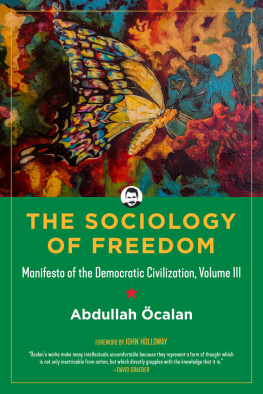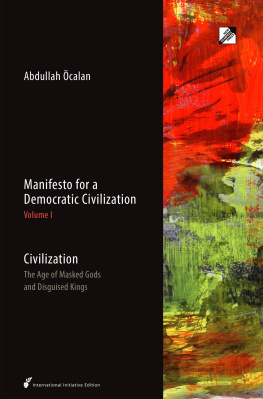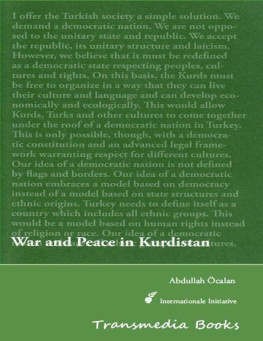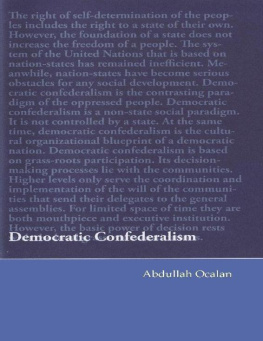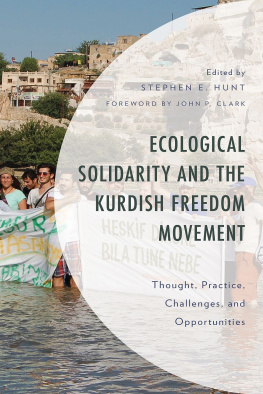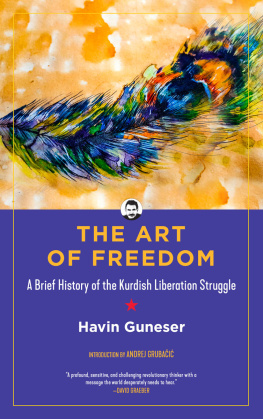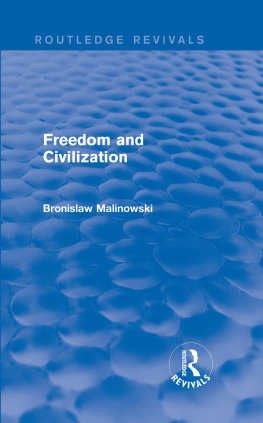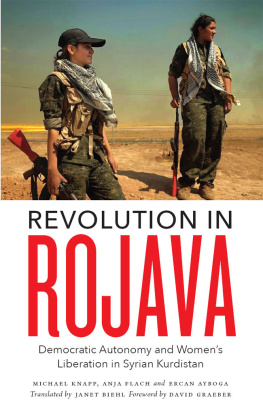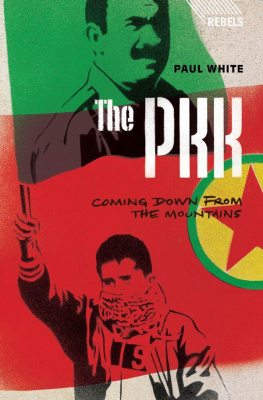calans works make many intellectuals uncomfortable, because they represent a form of thought that is not only inextricable from action but also directly grapples with the knowledge that it is.
David Graeber, author of Debt: The First 5,000 Years (Melville House 2011)
calans writings, written in captivity, are in the tradition of the ideology of the PKK, a left national liberation movement that seeks to change its own society. However, calan, apparently also one of those whose political thinking has been sharpened by the forced abstinence from daily politics, has succeeded in further developing his political thought in captivity.
Thomas Schmidinger, author of The Battle for the Mountain of the Kurds (PM Press 2019)
calans plea to build a strong and complex self-organized civil society without taking direct action against the state is similar to Zapatismo in Chiapas. Finally, this calls to mind Karl Marxs realization: An idea becomes material violence when it seizes the masses. And Abdullah calans message has seized the masses in Kurdistan.
Nikolaus Brauns, historian and journalist, author of Partisanen einer neuen Welt (Buchmacherei 2018)
Where else would you expect to find a world-class political genius than prison? And I dont use the word genius lightly.
Peter Lamborn Wilson, author of Ploughing the Clouds (City Lights 2001) and Sacred Drift (City Lights 2001)
calan is the Gramsci of our time.
Tamir Bar-On, author of The World through Soccer (Rowman & Littlefield 2014) and Beyond Soccer (Rowman & Littlefield 2017)
In ancient Greek philosophy, kairos signifies the right time or the moment of transition. We believe that we live in such a transitional period. The most important task of social science in time of transformation is to transform itself into a force of liberation. Kairos, an editorial imprint of the Anthropology and Social Change department housed in the California Institute of Integral Studies, publishes groundbreaking works in critical social sciences, including anthropology, sociology, geography, theory of education, political ecology, political theory, and history.
Series editor: Andrej Grubai
Recent and featured Kairos books:
Building Free Life: Dialogues with calan edited by International Initiative
Practical Utopia: Strategies for a Desirable Society by Michael Albert
In, Against, and Beyond Capitalism: The San Francisco Lectures by John Holloway
Anthropocene or Capitalocene? Nature, History, and the Crisis of Capitalism edited by Jason W. Moore
We Are the Crisis of Capital: A John Holloway Reader by John Holloway
Archive That, Comrade! Left Legacies and the Counter Culture of Remembrance by Phil Cohen
Re-enchanting the World: Feminism and the Politics of the Commons by Silvia Federici
Autonomy Is in Our Hearts: Zapatista Autonomous Government through the Lens of the Tsotsil Language by Dylan Eldredge Fitzwater
The Battle for the Mountain of the Kurds: Self-Determination and Ethnic Cleansing in the Afrin Region of Rojava by Thomas Schmidinger
Beyond the Periphery of the Skin: Rethinking, Remaking, and Reclaiming the Body in Contemporary Capitalism by Silvia Federici
For more information visit www.pmpress.org/blog/kairos/
The Sociology of Freedom: Manifesto of the Democratic Civilization, Volume III
Abdullah calan
2020 PM Press.
All rights reserved. No part of this book may be transmitted by any means without permission in writing from the publisher.
ISBN: 9781629637105 (paperback)
ISBN: 9781629637655 (hardback)
ISBN: 9781629637730 (ebook)
Library of Congress Control Number: 2019933020
Cover Image: Perperik by Ercan Altunta, oil and natural colors on canvas, 60 80 cm
Cover by John Yates / www.stealworks.com
Interior design by briandesign
10 9 8 7 6 5 4 3 2 1
PM Press
PO Box 23912
Oakland, CA 94623
www.pmpress.org
Printed in the USA.
Published with International Initiative Edition
International Initiative
Freedom for Abdullah calan Peace in Kurdistan
P.O. Box 100 511
D-50445 Cologne
Germany
www.freeocalan.org
Original title: zgrlk Sosyolojisi
First published in 2009 by Mezopotamien Verlag, Neuss
Translation by Havin Guneser
Contents
FOREWORD |
ONE | Preface |
TWO | Introduction |
THREE | Some Problems of Methodology |
FOUR | The Question of Freedom |
FIVE | The Power of Social Reason |
SIX | The Emergence of the Social Problem |
Defining the Problem of Historical-Society |
The First Major Problematic Stage of the Monopoly of Civilization |
From Rome to Amsterdam |
Eurocentric Civilizations Hegemonic Rule |
Social Problems |
The Problem of Power and the State |
Societys Moral and Political Problem |
Societys Mentality Problem |
Societys Economic Problem |
Societys Industrialism Problem |
Societys Ecological Problem |
Social Sexism, the Family, Women, and the Population Problem |
Societys Urbanization Problem |
Societys Class and Bureaucracy Problem |
Societys Education and Health Problems |
Societys Militarism Problem |
Societys Peace and Democracy Problem |
SEVEN | Envisaging the System of Democratic Civilization |
Definition of Democratic Civilization |
The Methodological Approach to Democratic Civilization |
A Draft of the History of Democratic Civilization |
Elements of Democratic Civilization |
Clans |
The Family |
Tribes and Airets |
Peoples and Nations |
Village and City |
Mentality and Economy |
Democratic Politics and Self-Defense |
EIGHT | Democratic Modernity versus Capitalist Modernity |
Deconstructing Capitalism and Modernity |
The Industrialism Dimension of Modernity and Democratic Modernity |
The Nation-State, Modernity, and Democratic Confederalism |
|

